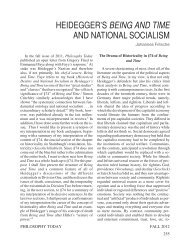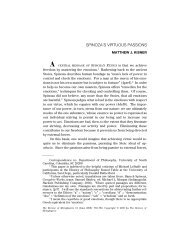Why Saying “I'm Sorry” Isn't Good Enough: The Ethics of Corporate ...
Why Saying “I'm Sorry” Isn't Good Enough: The Ethics of Corporate ...
Why Saying “I'm Sorry” Isn't Good Enough: The Ethics of Corporate ...
You also want an ePaper? Increase the reach of your titles
YUMPU automatically turns print PDFs into web optimized ePapers that Google loves.
<strong>Ethics</strong> <strong>Corporate</strong> Apologies<br />
by name some <strong>of</strong> the worrisome and suspect practices widely believed to be rampant in<br />
the mortgage industry as a whole. Or he could have admitted to some specific errors in<br />
business judgment on the part <strong>of</strong> Citigroup’s leadership. Courts generally do not hold<br />
executives and boards <strong>of</strong> directors legally responsible for business judgment mistakes.<br />
Instead, Prince regrets his failure to foresee that which was allegedly unprecedented and,<br />
therefore, likely unforeseeable. In other words, his apology is not an apology at all<br />
because no one needs to take responsibility for the failure to be omniscient.<br />
Prince clearly understands that his audience is expecting an apology. He argues, in effect,<br />
that neither he nor any other bank can legitimately be held accountable by the audience<br />
because everyone held the same false belief that mortgage-backed securities were safe:<br />
“Everyone, including our risk managers, other banks, and CDO structurers, all believed<br />
that these …securities held virtually no risk. It is hard for me to fault the traders who<br />
made the decisions to retain these positions on Citi’s books” (quoted in Dash, 2010, 1).<br />
Former Citigroup board member Robert Rubin provided an analogous minimization. As<br />
the Times put it, Citigroup board member Rubin “also showed some contrition but<br />
stopped short <strong>of</strong> accepting responsibility for the banks’ woes [by citing] at least nine<br />
different causes for the financial crisis, which formed a toxic cocktail that, he claims,<br />
‘almost all <strong>of</strong> us’ missed” (quoted in Dash et al, 2010, 1). Like his fellow bankers, Rubin<br />
was conspicuously vague when it came to admitting what he and the banks did (or failed<br />
to do) to contribute to the crisis. vii <strong>The</strong> absence <strong>of</strong> any detailed discussion as to what these<br />
financial firms did wrong and why these actions were problematic makes it difficult for<br />
the audience to believe that these executives grasped the magnitude <strong>of</strong> their firms’<br />
wrongdoing. Such perceived cluelessness – or dishonesty – can lead audience members<br />
18

















